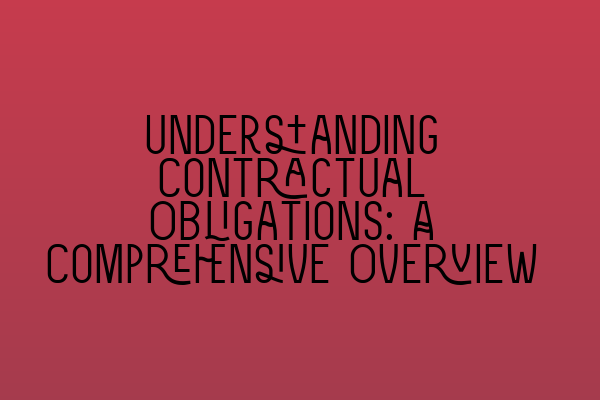Understanding Contractual Obligations: A Comprehensive Overview
In the world of contract law, understanding and fulfilling contractual obligations is essential for businesses and individuals alike. Contracts serve as legally binding agreements that dictate the rights and responsibilities of all parties involved. Whether you are a solicitor, business owner, or simply someone who wants to know more about contractual obligations, this comprehensive overview will provide you with the knowledge you need.
What are Contractual Obligations?
Contractual obligations can be defined as the duties and responsibilities that parties agree to when entering into a contract. These obligations can take various forms and may include performance obligations, payment obligations, confidentiality obligations, and more. It is important to note that contractual obligations are legally enforceable, meaning that failure to fulfill them can lead to legal consequences.
Types of Contractual Obligations
1. Performance Obligations
Performance obligations refer to the duties and tasks that parties agree to perform under the contract. For example, in a construction contract, the contractor may be obligated to complete the construction project within a specific timeframe while adhering to certain quality standards. Conversely, the client may be obligated to make timely payments for the services rendered.
2. Payment Obligations
Payment obligations are perhaps the most common type of contractual obligation. This obligation requires one party to make specified payments to the other party in exchange for goods, services, or other considerations. Failure to fulfill payment obligations can result in legal action, such as a breach of contract claim.
3. Confidentiality Obligations
Confidentiality obligations are prevalent in contracts involving sensitive information, such as non-disclosure agreements (NDAs) or employment contracts. Parties may be obligated to keep certain information confidential and may face legal consequences for disclosing such information without proper authorization.
4. Non-compete Obligations
Non-compete obligations prevent one party from engaging in activities that may compete with the other party’s business interests. These obligations can be particularly relevant in employment contracts or contracts involving the sale of a business. Violation of non-compete obligations can lead to legal disputes and potential damages.
5. Indemnity Obligations
Indemnity obligations require one party to compensate the other party for any losses, damages, or liabilities arising from specified events. These obligations are often included in contracts to allocate risk and protect parties from potential financial burdens.
Importance of Fulfilling Contractual Obligations
Fulfilling contractual obligations is crucial for maintaining trust and credibility in business relationships. When parties fail to meet their obligations, it can lead to disputes, damaged reputations, and even legal battles. Additionally, breach of contract claims can result in financial penalties and compensation for the injured party.
To illustrate the importance of understanding and fulfilling contractual obligations, let’s explore a real-life case study. In the case of ABC Company v. XYZ Supplier, ABC Company failed to make timely payments for the goods delivered by XYZ Supplier. This breach of payment obligations led to strained business relationships and disrupted the supply chain. Ultimately, ABC Company was held liable for the outstanding payments, legal costs, and damages suffered by XYZ Supplier.
Understanding and managing contractual obligations is a fundamental skill for solicitors. It enables them to guide their clients through the intricacies of contract law, draft robust and enforceable contracts, and handle any disputes that may arise. To learn more about legal practice and decision-making, make sure to read our related article on Unveiling Real-Life Case Studies: Insights into Legal Practice and Decision-Making.
In conclusion, contractual obligations play a crucial role in shaping business relationships and protecting parties’ interests. Whether you are a solicitor or an individual conducting business, understanding these obligations is essential to navigate the complex world of contract law. To explore more topics related to the legal profession, check out our other articles:
– Exploring Solicitor Salaries in the UK: Average Earnings and Factors Affecting Income
– Mastering Client Relationship Management: Skills for Solicitors to Enhance Trust and Loyalty
– Pursuing a Law School Education in the UK: Choosing the Right Path for Your Future
– Securing Training Contracts: A Roadmap to Becoming a Solicitor
Remember, a solid understanding of contractual obligations is not only a legal requirement but also a valuable skill in building successful business relationships.
